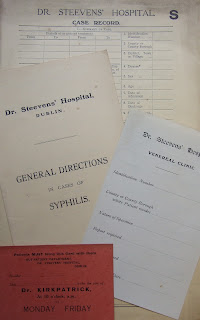Dr Kirkpatrick – Medical Practitioner
Since I started working for the RCPI Heritage Centre, I have heard a lot about Dr Kirkpatrick. For over 40 years, in the first half of the twentieth century Dr Kirkpatrick was the Registrar of the College, during which time he was instrumental in maintaining good record keeping practices which have been of great benefit to the College archive. Dr Kirkpatrick also left to the college much of his own library, his personal papers and collections of manuscripts (which I am in the process of cataloguing) and his amazing index of newspaper cuttings on Irish medics, which contains details of over 10,000 Irish doctors from the earliest times to the 1950s.
Kirkpatrick is, perhaps, best remembered for his writing on the history of medicine. He was an early pioneer in this field, writing books and pamphlets on several Dublin hospitals, the medical school of TCD and biographical studies of many leading Irish physicians. But Kirkpatrick was also a practicing doctor, as his archive shows.
Thomas Percy Claude Kirkpatrick, known as Percy or Kirk, was born in 1869 the second son of another physician Dr John Rutherford Kirkpatrick. Kirk studied first history in Trinity College, graduating BA in 1891, before taking his MB and MD from the same college in 1895. The archive holds lecture notes from his time as both a history and medical student. He was admitted a Licentiate and Member of the College in 1902 and Fellow in 1904.
Kirk's medical career is most associated with Dr Steevens' Hospital, where following qualification, he was first anaesthetist and then visiting physician. His career as an anaesthetist is well documented in his surviving papers with fee books, research notes and case books, including a record of all the anaesthetics he administered in Steevens' hospital during 1900, with details of how the patient responded.
Aside from anaesthetics the other area of particular interest in Kirk's medical practice was venereal diseases (now sexually transmitted diseases). At both Steevens' and the Westmoreland Lock Hospital, where he was also visiting physician, Kirk undertook research into, and treatment of, venereal diseases.

During the early decades of the twentieth century venereal diseases were on the increase and patients were still heavily stigmatised. Kirk established an early morning clinic at Steevens' hospital so women, many of whom were prostitutes, could come and receive treatment anonymously.
[1] Amongst Kirk's papers are many documents and research notes relating to this area, including notes and statistics on six years of treatment at Steevens' and Westmoreland Lock Hospitals, draft medical reports for the Lock Hospital and proofs for his 1923 article on '
The Work of a Venereal Diseases Centre'.
Finally and perhaps most interestingly, in a survey of the archive material relating to Kirk's medical career is a collection of over 100 letters from patients to Dr Kirkpatrick covering a period of over 20 years. These letters show that he took his pastoral care role to his patients very seriously. The letters are from current and former patients asking for help or advice or just letting him know how they are. Many also show that Kirkpatrick wrote back to his patients and kept in touch with them. Bearing out the words of Kirkpatrick's friend William Doolin in his obituary of Kirkpatrick, Doolin wrote that 'Kirk was that rare and lovely being, a humanist in his outlook and in his interests, his humanism lightened by compassion.'[2]
References [1] and [2] Lyons, J B, 'Thomas Percy Claude Kirkpatrick' in Dictionary of Irish Biography
Images
* Portrait of Dr Kirkpatrick, RCPI 39
* Print of TCD library and anatomy house, from Kirkpatrick's history of Trinity's medical school, published 1912
* Remaining images are all taken from items in the Kirkpatrick archive collection.